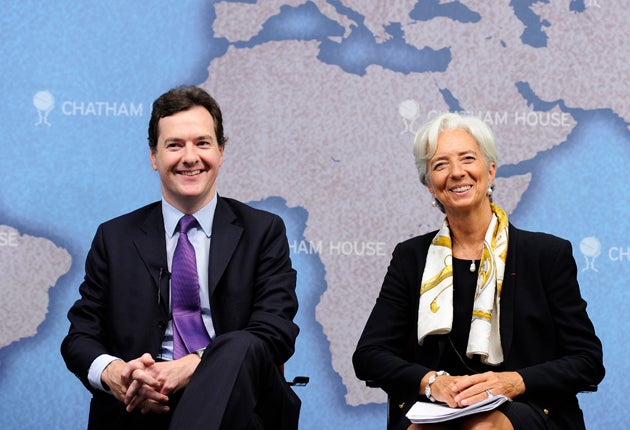The head of the International Monetary Fund, Christine Lagarde, told George Osborne yesterday that he should be prepared to change course on his deficit reduction plans if Britain's economic recovery stalls.
She described the Chancellor's present policy, which aims to eradicate the structural deficit by 2015, as "appropriate", but said there should be a "heightened readiness to respond" from Mr Osborne if growth falls short of expectations and unemployment rises.
Earlier this week, the OECD forecast that growth in Britain during the second half of 2011 would come to a virtual standstill, expanding by less than 0.2 per cent over the six months. If that comes to pass, the conditions that Ms Lagarde said should prompt a change of course would be realised.
The Chancellor, who appeared alongside Ms Lagarde at a joint event at Chatham House in London yesterday morning, claimed that the words of the IMF managing director amounted to robust support for his strategy. He also stressed that the Government would not budge from its fiscal plans. "Britain will stick to the deficit plan we've set out," he said. "It's the rock of stability on which our recovery is built."
Ms Lagarde was careful not to criticise the UK Government's economic policy directly, not least because Mr Osborne backed her strongly for the role of IMF chief. But this was not the glowing endorsement that Mr Osborne has received in the past from the organisation. The enthusiasm of the IMF for Britain's ambitious plan has steadily declined over the past year.
Last September, the IMF, which was then under the leadership of Dominique Strauss-Kahn, gave unqualified backing to the Chancellor's ambitious deficit reduction strategy, arguing that "the plan greatly reduces the risk of a costly loss of confidence in public finances and supports a balanced recovery". Britain's economy, it declared, was "on the mend".
Yet, a report on Britain by the IMF two months ago pointed to risks that declining business and consumer confidence could "cause the economy to stall and enter a period of prolonged low growth". The IMF argued that, under such a scenario, the Government should be prepared to enact "temporary targeted tax cuts".
The shadow Chancellor, Ed Balls, said yesterday: "While George Osborne insists there can never be a change of course and we must plough on regardless, Christine Lagarde rightly warns ministers will need to act if slow growth and high unemployment continues."
Ms Lagarde and Mr Osborne were speaking before travelling to a meeting of G7 finance ministers and central bankers in Marseille. The gathering will attempt to forge a "co-ordinated response" to threats that advanced nations are sliding back into recession.
Ms Lagarde restated her view that other nations that can still borrow freely in the global capital markets should slow their pace of fiscal consolidation in order to support domestic growth. And she gave her backing to President Barack Obama, who this week urged Congress to pass a $447bn job creation package to boost the US economy.

Join our commenting forum
Join thought-provoking conversations, follow other Independent readers and see their replies
Comments